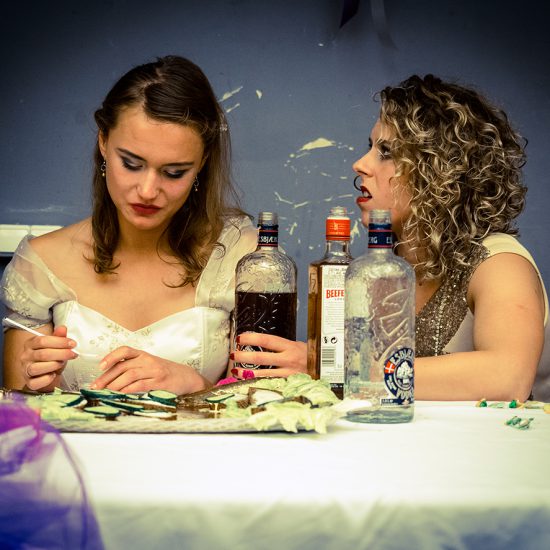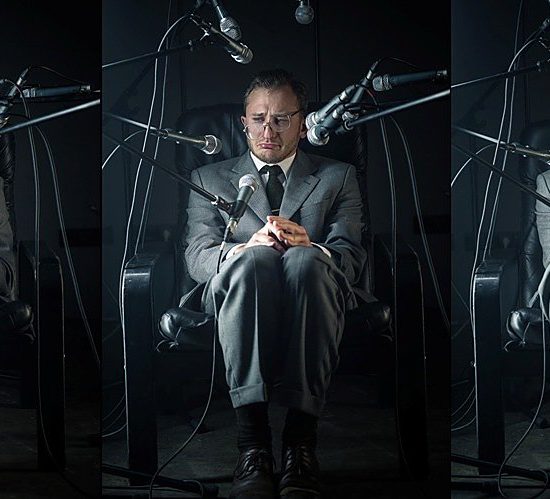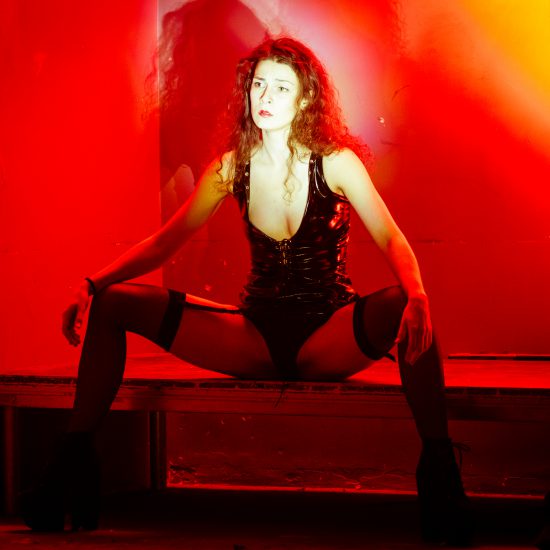Endgame or the Tempest in the Creator’s Soul
<…> The premiere, which surprised us with unexpected directorial decisions, used the classical text to reactualize the Soviet period. Also, it in a way established a new creative route, already defined by the director in Hamlet and highlighted in the staging of The Lower Depths.
<…>
From the first scenes of the play it is clear that Prospero (Povilas Budrys) and Miranda (Airida Gintautaitė) represent two different elements, two opposite outlooks. Through the huge glass swing door, the people gathering in the hall before the performance can see Prospero nervously walking on the stage and Miranda sprawled on the old armchair, barely alive. Having emphasized the fundamental psychophysical differences, Koršunovas places both characters at an old chessboard. Expressive directorial decisions and scenographic details by Darius Liškevičius outline the main rules of the game/play.
<…>
Only two characters remain in the performance. Miranda is “imprisoned” in her armchair; she can barely move or speak (a physically constraint person is a common strategy of the absurdists, for example, Mr. Hamm of Beckett’s Endgame, can neither walk or see). Prospero, on the other hand, is jumpy; he wants to run away from his home that he sees as a prison, and keeps waiting for some kind of fateful phone call (similar to Hamm’s servant Clov). Both characters of the play are drowning in the sea of Soviet household utensils and Prospero’s books. And the chessboard, of course, is there for a reason.
The performance seems to have started before its official beginning, Prospero, feeling anxious, enters through the sliding door in the middle of the stage and begins to turn the old lamp TV set. The latter scene invites comparison with Kostas Smoriginas’ sketch in The Square, directed by Eimuntas Nekrošius. He sits down at the chessboard, wakes Miranda and… attacks. The game begins (or, maybe, is continued?).
The Game Begins. A Storm in the Soup Kettle.
Paradoxically, Koršunovas seems to be returning to the chamber form. Hamlet, produced three years ago, already marked a rather sharp turn in his directorial language – from Master and Margarita, Romeo and Juliet, Playing the Victim and other spectacular performances, especially those produced abroad, to the strict black-and-white palette of colors with a pinch of fatal red and minimalist set design. More than that, the director moved Gorky’s The Lower Depths into the tiny OKT rehearsal hall, where the actors are only a step away from the audience.
Miranda is in a strange position between sharp audiovisual solutions and intertextual playfulness: on one side there is the exaggerated, metaphorized domesticity of Fireface, and on the other – the metatheatrical magic of Hamlet. <…>
True, in Koršunovas’ Miranda, Prospero (Povilas Budrys) is completely different – he is expressive, grotesque, and tragic, colorful and unexpected. It is the first time that we see the actor in this line of character. The magic of this Prospero is in his books, to be more precise – in The Tempest by Shakespeare, which he, a (post) Soviet intellectual, imprisoned in his flat-cage, reads to his daughter Miranda every night.
By turning the young and innocent Miranda into a physically and, it seems, emotionally sick woman, Koršunovas does more than simply outline the interpretation of the performance. By constraining, at least in the beginning, the two main tools of the actor’s theatrical expression – the body and voice – the director leaves Airida Gintautaitė unarmed, and that’s what I call a real professional challenge. It is difficult to properly assess her acting as the play has not yet premiered in Lithuania, but in Gdansk, where the performance was introduced to the Polish audience, Gintautaitė, for whom this role is perhaps her biggest so far, justified the director’s confidence or was very close to justifying it.
Koršunovas squeezes his actors into a tiny, crammed, colorless, yet homogeneous rectangle – a room in an apartment block, very familiar to many people from the Eastern Bloc countries. So the setting becomes the essential part of the directorial interpretation. The space crammed with books, furniture, and different machines is the actual desert island of The Tempest, to which the rightful Duke of Milan, Prospero, and his daughter have been banished.
Middlegame. Gorbachev, Nekrošius and Other Demons
<…>
The link between the action on the stage and the real time has always been important to Koršunovas. Although in Miranda he has another look at the end of the Soviet period, the audience’s reaction and the discussion after the performance confirmed that decades-old wounds have not yet fully healed.
<…>
The latest work by Koršunovas is full of quotes, including quotes of his own work, hidden intertextual references and parody elements. Although in terms of dramaturgy Miranda is based on The Tempest, the director seamlessly blends in paraphrases from a few other dramas by Shakespeare, and adds fragments from everyday political discourse and the theater reality of today’s Lithuania.
As TV and radio are broadcasting old news in Russian, Prospero embarks on a game “if I were the owner of this island,” and declares (in Russian): “If there is gas, there is democracy, if there is no gas, there is no democracy.” Even in the texts that preceded the performance the director talked about conflict with the government, and opposition to the authorities. Prospero with all his psychophysics clearly shows the infinite desire to break free. But when the lips of the character played by Budrys suddenly begin to speak Nekrošius’ words (Budrys, as we know, can be considered a “Nekrošius actor”), it becomes clear that Miranda is an attempt to break free, escaping not only from the ghosts of the historical past (and it is still not so far away that you can not call it the present). It is a kind of therapy, confronting one’s personal and professional demons. It’s not clear which – political or professional – shackles constrain Prospero more.
Endgame. Liberation?
Leaving only two of the many characters of the Shakespeare’s play – Prospero and Miranda – Koršunovas was being risky, even adventurous. But he won: with enviable transparency of directorial and dramaturgical thought he uncovered the interpretational codes of The Tempest, which even Shakespeare was hardly aware of, by also keeping the Shakespearean paradox, which continues provoking the viewer’s consciousness and imagination long after the performance is over.
<…> Miranda’s powerful imagination conquers the stage space and creates Prospero, who takes on three completely opposite forms of masculinity in the play: he is a caring father, the brutal and lustful Caliban, and the smug and flirty, and I would say, even homosexual (or asexual) Ferdinand.
Miranda is Prospero’s wings, his soul, flittering like a swan from Pyotr Tchaikovsky’s ballet at the end of the play. Prospero is Miranda’s fantasy. At the beginning of the performance, when Prospero flounces about behind the glass door, Miranda slumbers in her armchair, and in the final scene Miranda is fluttering like a bird while Prospero is lying collapsed. The creator dies but his creation triumphs – Miranda’s fantasy and Miranda like a fantasy. Maybe Prospero’s liberation lies in Miranda’s imagination, and the freedom of the creator – in his creation?
They say that the creator dies when his or her work dies. At the end of the performance, drinking the last sip of vodka from the bottle, Prospero makes the final chess move sitting in Miranda’s armchair. The phone rings – the call he had been eagerly waiting for during the entire performance. Is it the end of the game or is it just another castling?



